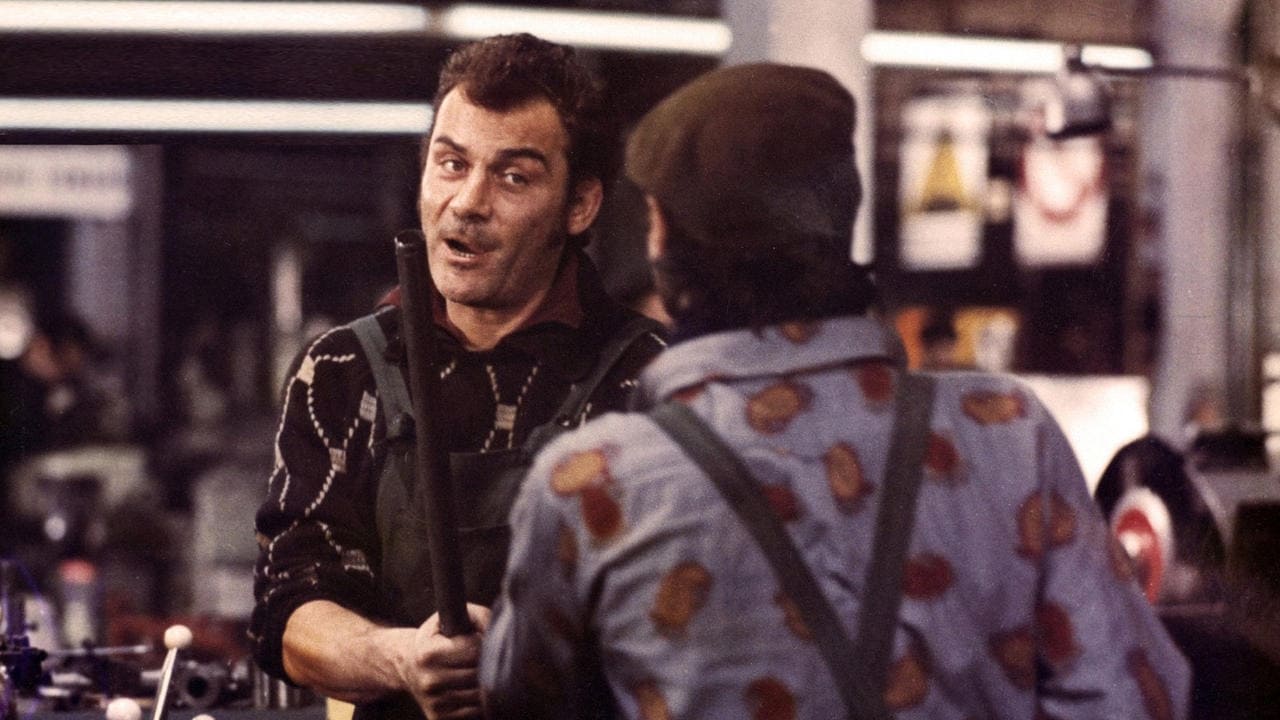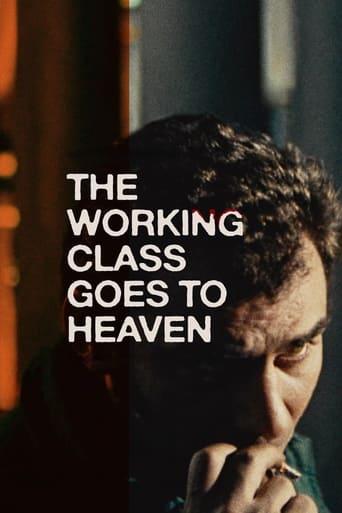

The efficient and productive Lulu Massa (Gian Maria Volontè) is an exemplary and beloved worker for his employers and hated by his coworkers. During a period of turbulence in the factory between the union and the radical students against the owners, Lulu accidentally loses one of his fingers. He changes his behavior and joins the movement of the students that wants to stop the factory with a strike as part of the fight of classes while the union wants a partial strike to reclaim benefits to the working class. When Lulu is fired, and gets confused with the new situation. But the union includes his readmission as a subject to be discussed with the owners and Lulu is hired again.When I saw "La Classe Operaia Va in Paradiso" in the movie theaters many years ago, the fight between capitalism and socialism was in the top in the world and this movie depicted actually the fight between ideology, represented by the movement of radical students, and the reactionary mass without political conscience and formed by explored workers. Lulu represents the servitude of the working class to the monopoly of the capitalist class. Presently this important movie is dated and youngsters may not understand its importance in the 70's. My vote is eight.Title (Brazil): "A Classe Operária Vai ao Paraíso" ("The Working Classe Góes to Paradise")
... View MoreThe Spirit of Social Justice of the May '68 uprisings is still very much alive in this heavy-going but compelling parable of the rise and fall in the fortunes of an Italian factory worker dubbed Lulu (Gian Maria Volonte'): starting out as the Boss' darling for being the exemplary employee and pacesetter of the company, the loathing of his co-workers (who despise him for how his excessive zeal makes their own lackluster performance look bad in the eyes of the manager) and his female companion Mariangela Melato (who never gets any piece of the action at night because of his constant fatigue) eventually gets to him one day with the result that he loses his concentration at work and suffers the loss of a finger in an accident. This changes his whole outlook on life as he becomes engrossed in an extremist workers' union, finally makes love in his car to a virginal female co-worker/union member he is obsessed with, is quitted by his consumerist hairdresser companion and his surrogate son and, when he is given the sack at work and is on the point of selling off his belongings, another more moderate workers' union comes to his aid by winning him his old job back. Although there is obviously much footage here of socio-political discussions, scenes of picketing and police riots, confrontations between diverse unions, etc., the film also has that winning whimsical streak promised by its title and exemplified by amusing episodes in a mental institution (where Volonte' visits his cracked-up ex-colleague Salvo Randone), the quasi-surreal sequence of Volonte' taking it out on all his useless possessions (including a giant inflatable doll of Scrooge McDuck!), and the concluding description at the assembly line of the titular incident itself which Volonte' had in a dream the previous night. Ennio Morricone's inventively 'metallic' music underscores the robotic gestures of the factory workers who, despite slaving eight hours a day at their machines, are not even aware what becomes of the parts they produce! While the film may seem overdone and dated in today's apathetic age, it clearly hit a nerve at the time of its release winning a handful of international awards including the Palme D'Or at the Cannes Film Festival.
... View MoreElio Petri is one of the most important Italian directors: he made some wonderful films about mafia, politics, justice and social equality. Gian Maria Volontè is, in my opinion, the best actor of the last decades of Twentieth Century in Italy: hot-tempered, brutal, passionate, he infuses these traits to his characters. Together, they are an explosive duet. LA CLASSE OPERAIA VA IN PARADISO tells the story of Ludovico "Lulù" Massa, a workaholic machinist who loses his finger in a machine: with his finger, he loses himself, he suffers from alienation and tiredness. But I don't want to spoil anything. The actors are wonderful: Gian Maria Volontè and Mariangela Melato as Lulu's mistress, Lidia, are like a time-bomb, absolutely perfect, both forceful characters. The dirty and denatured cinematography by Luigi Kuvellier, the monotonous and dreary production design by the future Academy Awards winner Dante Ferretti and the repetitive and disturbing score by Ennio Morricone help to build the alienating life of a worker in a big, inhuman factory. And then there's the nervous and indignant direction by Petri that blends everything. It should be screened more often, especially in the schools, but I'm pretty sure that modern Italian boys and girls won't understand this film and, as a result, won't appreciate it.
... View More"The Working Class Goes to Heaven" stars Gian Maria Volonté, who appeared in earlier Elio Petri films like "We Still Kill the Old Way" and "Investigation of a Citizen Above Suspicion." The Marxist director's critique of capitalist society is at play in this movie as in so many of his others. Volonté plays Lulù Massa, a lathe-operator in a Milan factory which pays by piece work. Lulù is a fast worker, the pride of the management and the bane of the workers who consider him a threat. The work is a nightmare of monotony, and the workers are continually timed and fined for underproduction. "Even a monkey could do this work," Lulù says.Like the comic tramp in Charlie Chaplin's 1935 "Modern Times," he feels dehumanized, exploited, empty. His relationship with his mistress and her TV-mesmerized son is strained. He asks an older friend in an insane asylum, "How did you know you were going mad? A man has a right to know what he is doing, what he's useful for."At the end of the conversation with his mad friend (Salvo Randone) at the asylum, the man begins to leave and Lulù inadvertently remains. The insane asylum seems normal, while the factory, the "real" world, appears insane.Lulù ignores the worker movement and strikers until he loses a finger in an accident while carelessly overworking. He becomes a symbol for the ills of the factory, and a radicalization process ensues until he is fired for taking a stand against the managers.Eventually re-hired and given a demeaning assembly-line job, he daydreams enviously of his friend in the madhouse.Gian Maria Volonté gives the beleaguered hero a pathetic and comic dimension which is always convincing, performing with bold strokes rather than by subtle illumination. Petri's directorial technique uses a similar approach. A highlight is an uproarious scene of lovemaking in a Fiat with co-worker Mieta Albertini.The film won the grand prize at Cannes in 1972. It runs two hours in its full version and 1½ hours in a truncated version peculiarly called "Lulu the Tool." It is a major Italian film from the 1970s.
... View More